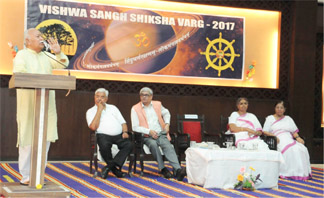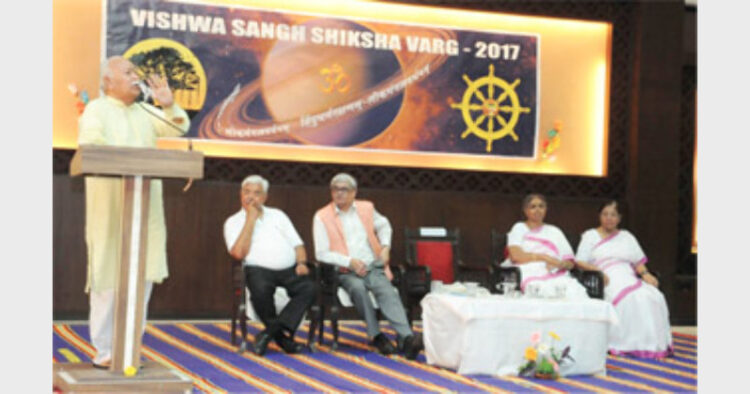 The 20-day Vishwa Sangh Shiksha Varg organised by Shri Vishwa Niketan and the 15- day Varg organised by Devi Ahilyabai Smarak Samiti for the Sevikas conclude in Nagpur on August 4. 65 HSS swayamsevaks from 13 countries and 47 Sevikas from five countries joined the Varg
The 20-day Vishwa Sangh Shiksha Varg organised by Shri Vishwa Niketan and the 15- day Varg organised by Devi Ahilyabai Smarak Samiti for the Sevikas conclude in Nagpur on August 4. 65 HSS swayamsevaks from 13 countries and 47 Sevikas from five countries joined the Varg
Nagpur: “The world today is plagued by various problems due to loss of dharma. The spread of radicalism shows that the world is losing the principle of good for all. Against this backdrop the rise of Bharat assumes significance as dharma is its core (prana). A strong and prosperous Bharat can lead the world to Vishwa Dharma,” said RSS Sarsanghachalak Shri Mohan Bhagwat, while addressing the joint concluding ceremonies of the Vishwa Sangh Shiksha Varga of the Hindu Swayamsevak Sangh (HSS) and the Hindu Sevika Samiti on August 5.
Participants for both the camps came from 13 countries including the US, Europe, Africa and Australia. The Varg was organised by Shri Vishwa Niketan Delhi and Devi Ahilyabai Smarak Samiti Nagpur. Noted economist and NITI Ayog member Bibek Debroy was the chief guest. Pramukh Sanchalika of the Rashtra Sevika Samiti Sushri Shantakka, Sarvadhikaris of the Varg Shri Alok Kumar and Shri Kirtida Bhat also shared the dais. In the beginning, Shri Roy and Shri Bhagwat paid tribute to Dr Hedgewar and performed Bharatmata pujan.
Unfolding the global vision of the RSS founder Dr Hedgewar, Shri Bhagwat said Dr Hedgewar envisioned a strong and
prosperous Bharat firmly rooted to its Dharma and helping other countries to break the shackles of slavery of capitalism. He said the HSS swayamsevaks are
treading the path shown by Dr Hedgewar and the countries like Kenya now boasts of having a similar organisation like the RSS. Each country should have its own
organisation like RSS and we should help them in achieving this task, he said.
He said whatsoever is one’s capability one should contribute to ensuring larger good with Dharma, thinking of the society as a nation and the world as one’s own. At the same time the Hindus should not blame the British or Muslims for their misfortune over the centuries. Hindus themselves are responsible for their condition. Hence, Hindus should strive to conserve the values of Dharma and achieve the good of the humanity.
Bibek Debroy said India is rising. The country is pulsating; it is overcoming tamas (darkness), and is imbibing rajas
(qualitative change), he said. He appealed to the HSS members from 13 countries to come to India and be part of its growth story. Beginning his address in Sanskrit, he later switched over to English spoke at length on the concept of Bharat, Karma and Dharma. Stating that he was proud to have been born in this country he said Bharat is Karmabhoomi and Dharmakshetra in the global context. Karma and Dharma were linked to each other. Dharma cannot be excised or removed from the life of the people. This explains the sparkle even in the eyes of the people who live in poverty and penury, he said.
Making a distinction between dharma and religion he said dharma emancipates while religion binds. Religion and science are perceived as opposed to each other. Religion is a matter of faith while science involves
empirical testing. Against this backdrop Hinduism with the concept of dharma emerges as an encompassing idea. He expressed concern over the youngsters using some terms fashionably. For Example, he said youngsters find it
fashionable to call them ‘agnostic’. The word is used as negative. It stands to negate being gnostic. The word gnostic is linked to knowledge. So, by claiming to be agnostic, what are they achieving? Do they really
understand this? Similarly, people call them atheist. This is attached to the word theist and cannot negative meaning. Do they know what theism is, he wondered.
Underlining the need of thinking deeply about
philosophical attributes for healthy growth of individuals as a global citizen, Shri Debroy said everyone should ask himself or herself a question “who am I?” Many people do not ask this question and as a result they do not find any purpose in their life. Some people think that they alone can change the world. In this universe we are so insignificant to effect any change. Hence, our mission in life should be to find reason behind our being here and improve ourselves thereby contributing to keep the goodness intact.
The Varg for men was organised at Suraburdi from July 15 to August 5. The participants took part in various
activities like Yoga, traditional Indian games, discourses on Hindu culture and heritage, etc. The Varg for women was organised at Smriti Mandir, Reshimbag from July 20 to August 5. A total of 47 participants from five countries took part in this Varg.
The Varg for the Sevikas was formally inaugurated on July 20 by Padmashri Kalpana Saroj. The Rashtra Sevika Samiti Pramukh Sanchalika Sushri Shantakka at the
inaugural ceremony appealed to all the participants to gather as much knowledge as possible from various
activities. There were various sessions like discourses, group discussions and workshops on Indian tradition, role of women in society, contemporary global challenges and Hindu thought etc. Some of the well known resource
persons like Dr Balasubramaniam of VLDI–Mysore, Swami Brahmaprakashananda from Ramkrishna Math also spoke. A visit to sewa projects including the Shakti Peeth, National Cancer Institute, Jamtha and a visit to a village near Ajni to give insight about village life was also arranged.
The participants expressed satisfaction about the
sessions and arrangements of the Varg. At the conclusion of the Varg, some of them became emotional as a strong bond had formed between the participants from various countries and the Nagpur volunteers and it was getting
difficult for them to leave the place where they were in action last fortnight. The pathsanchalan of the both the Vargs was organised on July 29. It was welcomed
enthusiastically by the residents of Nagpur where men and women marched in unison on the tunes of the band on the streets of Nagpur.
There were sessions on Sanskrit speaking, Vedic
mathematics, ancient Indian science and also lecture on Bhagavad Gita and Karmayog, Triguna Personality Quotient, etc. At night, there used to be light games and song and skit competitions. The age group the course was from 17 to 45 and all enjoyed the Varg in a brotherly
atmosphere. – Organiser Bureau













Comments